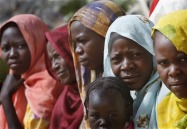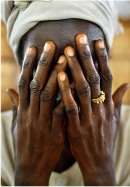Sudan: Gender Inequity

Kara Schmidt
Being insulted, beaten and raped is not something that you see every time a woman walks outside in the United States. In Sudan it is very common for these things to happen many, many times a day to women and nothing is being done about it. Gender Inequity is defined as the unfairness, lack of justice between men and women (3). Gender Inequity is a huge problem in Sudan and it keeps getting worse.
In the past Gender Inequity has not been this bad, but because of Darfur and the wars going on it just keeps getting worse and women are the ones being punished. Many of the men that commit these crimes are armed men that belong to Arab tribes and soldiers; basically men in uniforms1. Women are verbally abused, beaten with whips, and raped by multiple men all in one day. Sometimes women are shot in the ankle to keep from fleeing or to be marked as violated women (1). So far the authorities have been doing little to solve this issue and the crimes are rarely reported. The authorities mostly deny it because they do not believe that their soldiers would do such a thing. Thirteen women have been tracked down that have been raped in the last ten days that they were questioned by the United Nations refugee agency (1). Women are not being the only ones attacked; many boys are too. There has been a group of boys called ‘lost boys’ that fled their villages to stay alive and not get slaughtered like the rest of their family. Every male was shot and killed, and almost every female was taken away by the government troups (2). Many of the boys that ran away did not survive because they died of hunger, drowned, were eaten by wild animals, or were shot by soldiers they ran into.
For men it is normal to get circumcised, but for women it is a form of mutilation. The women do not have a rite in Africa to choose if they want to be genitally mutilated. It was all decided on the tribe that they were raised in and what their parents wanted to happen. As growing girls, they were taught that this is a process of ‘the celebration’, ‘purification’, ‘cleansing’, or the ‘beautification’(4). It is really a process that shows women are inferior and are not able to make their own choices in life, it also makes the probability of reproducing even lower. That means that their family tree may not continue with her generation. Genital Mutilation has been improving and has not become that big of an issue anymore. It is getting better and the high percentages of risk are being lowered and there is more equality in the decisions of women.
Gender Inequity is a huge problem in Sudan and it keeps getting worse. In some aspects you could say that it is getting better; like the genital mutilation example. Through another point of view you could say that things are terribly worse. Many more women are dying and getting beaten everyday and no one is trying to stop it from happening. We need to take action in this and try to stop the crimes against women. Women should not be treated this way, they have rights and they do not include being taken advantage of like that. Gender Inequity barely has any improvement. It is deteriorating.
1. Somini Sengupta
2. Leslie Goffe
3. www.yourdictionary.com
4. John Tierney
BIBLIOGRAPHY
Goffe, Leslie. Sudan’s ‘lost boys’ in America. BBC, New York 2004
This article helped me find information on how men and boys were slaughtered and women and children were taken away.
Sengupta, Somini. Attacks on Women in West Sudan Draw an Outcry. New York Times. 2004.
This article helped me find information on how badly women are treated in Sudan, and what it was like to live there for women.
Tierney, John. “Circumcision” or “Mutilation”? And Other Questions About a Rite in Africa. New York Times. 2009.
This article helped me find out information on the surgeries women were forced to undergo.
last updated by: Kara Schmidt May 22, 2009
Being insulted, beaten and raped is not something that you see every time a woman walks outside in the United States. In Sudan it is very common for these things to happen many, many times a day to women and nothing is being done about it. Gender Inequity is defined as the unfairness, lack of justice between men and women (3). Gender Inequity is a huge problem in Sudan and it keeps getting worse.
In the past Gender Inequity has not been this bad, but because of Darfur and the wars going on it just keeps getting worse and women are the ones being punished. Many of the men that commit these crimes are armed men that belong to Arab tribes and soldiers; basically men in uniforms1. Women are verbally abused, beaten with whips, and raped by multiple men all in one day. Sometimes women are shot in the ankle to keep from fleeing or to be marked as violated women (1). So far the authorities have been doing little to solve this issue and the crimes are rarely reported. The authorities mostly deny it because they do not believe that their soldiers would do such a thing. Thirteen women have been tracked down that have been raped in the last ten days that they were questioned by the United Nations refugee agency (1). Women are not being the only ones attacked; many boys are too. There has been a group of boys called ‘lost boys’ that fled their villages to stay alive and not get slaughtered like the rest of their family. Every male was shot and killed, and almost every female was taken away by the government troups (2). Many of the boys that ran away did not survive because they died of hunger, drowned, were eaten by wild animals, or were shot by soldiers they ran into.
For men it is normal to get circumcised, but for women it is a form of mutilation. The women do not have a rite in Africa to choose if they want to be genitally mutilated. It was all decided on the tribe that they were raised in and what their parents wanted to happen. As growing girls, they were taught that this is a process of ‘the celebration’, ‘purification’, ‘cleansing’, or the ‘beautification’(4). It is really a process that shows women are inferior and are not able to make their own choices in life, it also makes the probability of reproducing even lower. That means that their family tree may not continue with her generation. Genital Mutilation has been improving and has not become that big of an issue anymore. It is getting better and the high percentages of risk are being lowered and there is more equality in the decisions of women.
Gender Inequity is a huge problem in Sudan and it keeps getting worse. In some aspects you could say that it is getting better; like the genital mutilation example. Through another point of view you could say that things are terribly worse. Many more women are dying and getting beaten everyday and no one is trying to stop it from happening. We need to take action in this and try to stop the crimes against women. Women should not be treated this way, they have rights and they do not include being taken advantage of like that. Gender Inequity barely has any improvement. It is deteriorating.
1. Somini Sengupta
2. Leslie Goffe
3. www.yourdictionary.com
4. John Tierney
BIBLIOGRAPHY
Goffe, Leslie. Sudan’s ‘lost boys’ in America. BBC, New York 2004
This article helped me find information on how men and boys were slaughtered and women and children were taken away.
Sengupta, Somini. Attacks on Women in West Sudan Draw an Outcry. New York Times. 2004.
This article helped me find information on how badly women are treated in Sudan, and what it was like to live there for women.
Tierney, John. “Circumcision” or “Mutilation”? And Other Questions About a Rite in Africa. New York Times. 2009.
This article helped me find out information on the surgeries women were forced to undergo.
last updated by: Kara Schmidt May 22, 2009

